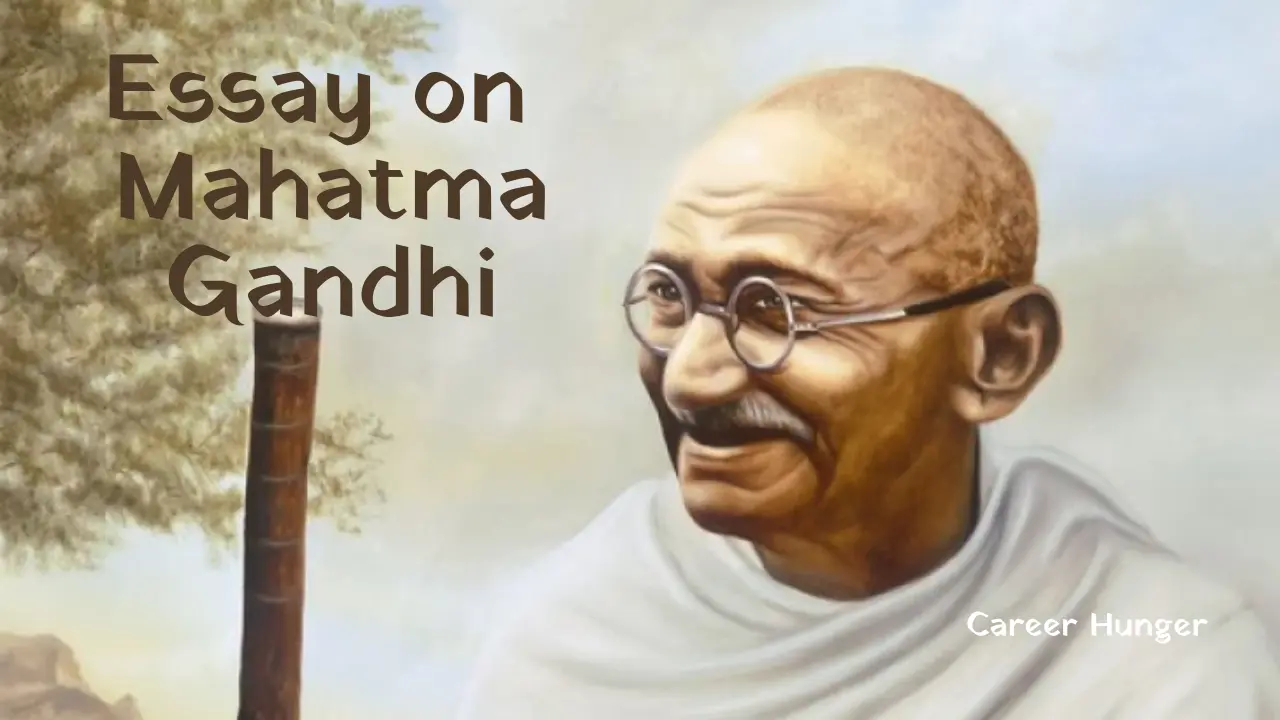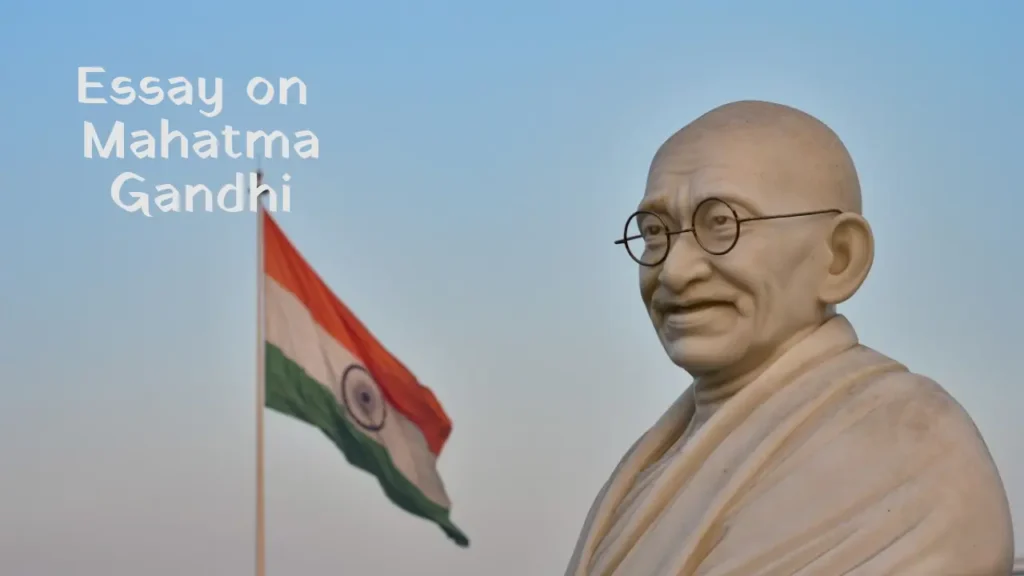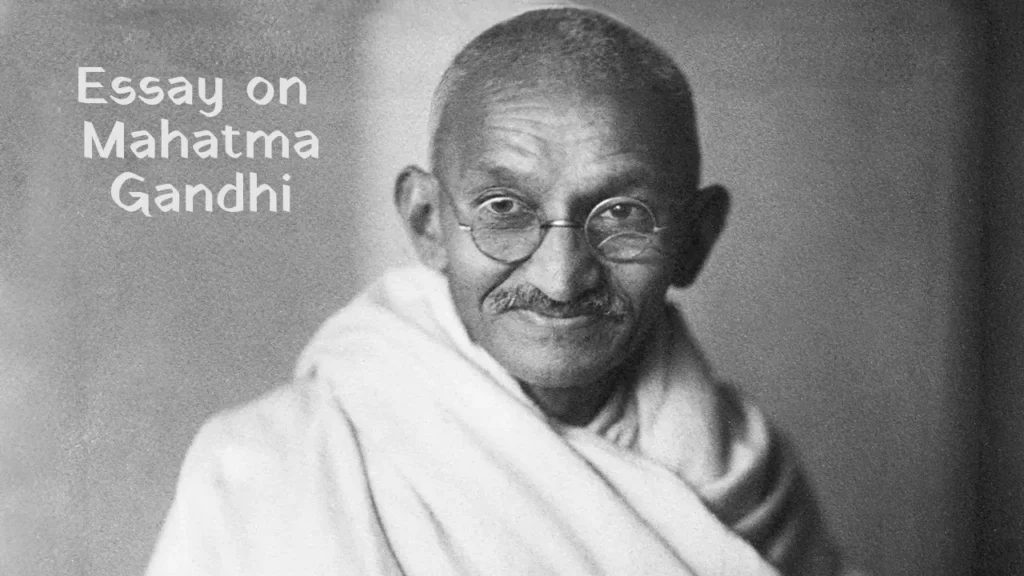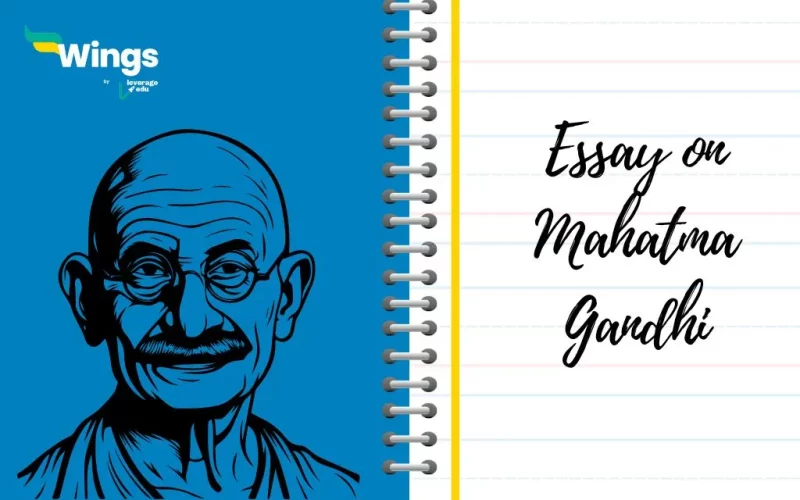

Career Hunger
Mahatma gandhi essay in english : 100, 200, 300, 500 words .
- July 8, 2024
- Essay , Learn

Mahatma Gandhi Essay
Mahatma Gandhi, often referred to as the Father of the Nation in India, remains one of the most iconic figures in the history of the world. His life and principles continue to inspire generations, transcending boundaries of time and geography. From leading India’s struggle for independence through nonviolent resistance to advocating for social justice and communal harmony, Gandhi’s legacy is profound and enduring.
In this blog, we delve into the life, achievements, and impact of Mahatma Gandhi through essays of varying lengths 100, 200, 300, and 500 words. Each essay provides a comprehensive exploration of Gandhi’s early influences, his leadership during India’s independence movement, and his global influence on peace and human rights. We examine his core values of truth, simplicity, and self-discipline, highlighting their relevance in today’s world.
Through these essays, readers will gain insights into Gandhi’s unwavering commitment to nonviolence, his struggles and triumphs, and the lessons his life offers for fostering empathy, tolerance, and sustainable development. Join us on a journey to discover the essence of Mahatma Gandhi’s teachings and their profound impact on shaping a better future for humanity.

Mahatma Gandhi, a name synonymous with peace, nonviolence, and freedom, played a pivotal role in India’s struggle for independence from British rule. His life and principles continue to inspire people around the world.
Gandhi was born on October 2, 1869, in Porbandar, India. From a young age, he showed a deep compassion for others and a strong sense of justice. He studied law in London and later practiced in South Africa, where he experienced firsthand the discrimination faced by Indians. This experience awakened his sense of duty to fight against injustice.
Gandhi’s philosophy of nonviolence, known as ‘ahimsa,’ became the cornerstone of his struggle for India’s independence. He believed that change could be achieved through peaceful means, without harming others. This idea resonated deeply with millions of Indians who joined him in civil disobedience movements and peaceful protests.
Central to Gandhi’s philosophy were simplicity and truth. He lived a modest life, wearing simple clothes and advocating for self-sufficiency through cottage industries like spinning cloth. His commitment to truth, even in the face of adversity, earned him the title ‘Mahatma,’ which means ‘Great Soul.’
Gandhi’s leadership during India’s freedom struggle was transformative. His Salt March in 1930, where he walked 240 miles to protest against the British salt monopoly, captured the world’s attention. His belief in the dignity of every human being, regardless of their background, inspired unity among Indians of different religions and castes.
Even beyond India, Gandhi’s influence was profound. Leaders like Martin Luther King Jr. in the United States and Nelson Mandela in South Africa were inspired by his principles of nonviolence in their own fights against injustice.
In today’s world, Gandhi’s values of simplicity, truth, and self-discipline remain as relevant as ever. In a world often divided by conflict and inequality, his message of peaceful resistance and respect for all people serves as a powerful example.

Mahatma Gandhi’s legacy as one of history’s most influential leaders is undeniable. His ability to mobilize people through nonviolent resistance and his unwavering commitment to justice continue to inspire generations. His life teaches us that positive change can be achieved through compassion, perseverance, and the courage to stand up for what is right.
Mahatma Gandhi’s life and teachings remind us that each of us has the power to make a difference in the world. By embracing his principles of nonviolence, truth, and simplicity, we can create a better future for ourselves and for generations to come.
Mahatma Gandhi Essay In 100 Words
Mahatma Gandhi, born in 1869, led India to independence from British rule using nonviolence and civil disobedience. He believed in truth, simplicity, and self-discipline, inspiring millions. Gandhi’s values are timeless truthfulness, living simply, and having self control. Today, these principles help us tackle challenges peacefully and respectfully. Gandhi’s influence extended globally, becoming a symbol of peace and justice. His legacy teaches us to stand up for what’s right and make positive changes in our communities. By following his example, students can learn to lead with kindness, integrity, and courage, creating a better world for everyone.

Mahatma Gandhi Essay In 150 Words
Mahatma Gandhi, born in 1869, led India to independence from British rule using nonviolence and civil disobedience. He believed in truth, simplicity, and self discipline, inspiring millions to join him in peaceful protests. Gandhi’s values are timeless truthfulness helps us build trust, simplicity encourages us to live with less, and self-discipline teaches us to control our actions. Today, these principles are crucial for solving conflicts peacefully and respecting others. Gandhi became a global icon for peace and justice, influencing movements around the world. His legacy reminds us to stand up against injustice with courage and kindness. Mahatma Gandhi remains a symbol of hope and change because he showed that one person’s determination can bring freedom and equality. Students can learn from Gandhi’s perseverance and dedication to social justice by embracing compassion, fairness, and the belief that positive change is possible through peaceful means.
Mahatma Gandhi Essay In 200 Words
Mahatma Gandhi, born in 1869, played a crucial role in India’s fight for freedom from British rule. He believed in the power of nonviolent resistance, using peaceful protests and civil disobedience to challenge oppression. Gandhi’s principles of truth, simplicity, and self discipline guided his actions and inspired others to live with honesty, lead a modest life, and practice self-control.
Central to Gandhi’s philosophy was ahimsa, or nonviolence, and satyagraha, which means truth force. These ideas teach us to resolve conflicts peacefully and uphold justice without resorting to aggression. Today, they remain relevant in promoting social harmony and fairness.
Gandhi’s impact extended far beyond India. He became a global advocate for human rights and civil liberties, influencing movements worldwide. His legacy as a symbol of peace and moral integrity continues to inspire leaders and activists to stand up against injustice with empathy and resilience.
Mahatma Gandhi’s life teaches us valuable lessons: to embrace nonviolence, live with integrity, and use peaceful activism to create positive change in our communities and the world.
Mahatma Gandhi Essay In 300 Words
Mahatma Gandhi, born in 1869, emerged as a towering figure in India’s struggle for independence from British rule. His philosophy of nonviolence, or ahimsa, and civil disobedience became powerful tools against injustice and oppression. Gandhi’s core values of truth, simplicity, and self-discipline guided his actions and resonated widely, advocating for living honestly, leading a modest life, and exercising self-control in personal and societal contexts.
Gandhi’s leadership extended beyond India, inspiring global movements for human rights and social justice. His advocacy for peace and harmony among diverse communities left a lasting impact. Notable actions like the Salt March, where he walked 240 miles to protest British salt taxes, symbolized his commitment to civil disobedience and highlighted the power of peaceful protest.
Gandhi’s enduring legacy as a symbol of moral courage and integrity continues to influence leaders and activists worldwide. His teachings remain relevant today, promoting tolerance, empathy, and constructive dialogue in resolving conflicts peacefully.
Mahatma Gandhi’s life teaches us profound lessons: the power of nonviolence in achieving social change, the importance of living with integrity and simplicity, and the impact of individual actions in shaping a better world. Students are encouraged to reflect on how Gandhi’s principles can inspire them to make a positive difference in their own lives and communities, fostering a future built on justice, compassion, and understanding.
Mahatma Gandhi Essay In 500 Words
Mahatma Gandhi, born in 1869 in Porbandar, India, grew up in a devout Hindu family. His early life was marked by a strong sense of justice and a deep compassion for others. After studying law in London, Gandhi practiced in South Africa, where he witnessed firsthand the discrimination faced by Indians. This experience ignited his lifelong commitment to fighting injustice through nonviolent means.
Gandhi’s pivotal role in India’s struggle for independence from British rule began with his advocacy of nonviolent resistance and civil disobedience. He believed in confronting oppression with peaceful protests, such as the Salt March of 1930, where he walked 240 miles to challenge British salt taxes. This act symbolized Gandhi’s belief in self-sufficiency and the power of collective action.
Central to Gandhi’s philosophy were his core values of truth (satya), simplicity (simpla), and self-discipline (tapas). He lived a simple life, wore humble clothes, and practiced celibacy to focus on his mission. Gandhi’s principle of ahimsa, or nonviolence, became a powerful force for social change. It inspired millions in India and around the world to resist injustice peacefully, influencing movements for civil rights, freedom, and equality globally.
Beyond India, Gandhi’s influence extended to leaders like Martin Luther King Jr. in the United States and Nelson Mandela in South Africa, who embraced his methods of nonviolent resistance in their struggles for justice. Gandhi’s efforts also focused on promoting communal harmony and advocating for human rights on an international scale.
Despite facing numerous challenges and imprisonment during his lifetime, Gandhi remained steadfast in his commitment to nonviolence and truth. His teachings on empathy, tolerance, and sustainable development are particularly relevant today. In a world often divided by conflict and inequality, Gandhi’s emphasis on peaceful resolution and respect for all remains a guiding light.
Mahatma Gandhi’s life and teachings continue to inspire us to strive for a better world. His principles of nonviolence, truthfulness, and simplicity remind us of the power of individual actions in bringing about collective change. As students, reflecting on Gandhi’s legacy encourages us to embrace empathy, practice tolerance, and actively contribute to building a society rooted in justice and equality. Gandhi’s life demonstrates that each of us has the potential to make a profound difference through courage, compassion, and unwavering dedication to truth and nonviolence.
Essay on Mahatma Gandhi
Mahatma Gandhi, born on October 2, 1869, in Porbandar, India, was deeply influenced by his upbringing in a devout Hindu family and the teachings of Jainism. He studied law in London and practiced in South Africa, where he experienced racial discrimination. These early experiences shaped his philosophy of nonviolent resistance, or ahimsa, and his commitment to social justice.
Gandhi’s pivotal role in India’s independence movement began with his leadership in advocating for civil rights and challenging British colonial rule through nonviolent means. He emphasized the power of peaceful protests and civil disobedience, famously leading the Salt March in 1930 to protest against British salt taxes. This act galvanized the Indian masses and drew international attention to their plight.
Central to Gandhi’s life were his core values of truth, simplicity, and self-discipline. He lived a simple life, wore traditional Indian clothes, and embraced celibacy as a means of spiritual discipline. These principles guided his personal conduct and leadership style, earning him the title of “Mahatma,” meaning “Great Soul.”
Gandhi’s leadership extended beyond India, influencing global peace movements and inspiring leaders such as Martin Luther King Jr. in the United States and Nelson Mandela in South Africa. His philosophy of nonviolence became a guiding principle for civil rights movements worldwide, emphasizing dignity, equality, and justice for all.
Despite facing imprisonment and numerous challenges, Gandhi remained steadfast in his principles, advocating for communal harmony and social justice. His efforts to bridge religious and caste divides within India underscored his commitment to unity and inclusivity.
Mahatma Gandhi’s legacy as a symbol of moral courage and integrity endures today. His teachings on nonviolence, empathy, and sustainable development remain relevant in fostering peace and harmony in a world often marred by conflict and inequality. Gandhi’s life demonstrates that positive change can be achieved through compassion, perseverance, and a commitment to truth and justice.
Mahatma Gandhi’s life achievements and impact resonate globally as a testament to the power of peaceful activism and the enduring quest for human rights and social justice. His legacy inspires individuals of all ages to embrace empathy, promote tolerance, and work towards a more equitable and harmonious world.

Essay Writing in English | Guide to Writing an Essay

Importance of English Language Essay In English : 100, 200, 300, 500 Words

150+ Happy Marriage Anniversary Wishes

Wedding Anniversary Wishes

101+ Happy Anniversary Wishes for Couples

100+ Anniversary Wishes for your Love💖

Anniversary Wishes For Wife

Heart Touching Anniversary Wishes for Husband
Share this post.
[…] Mahatma Gandhi Essay In English : 100, 200, 300, 500 Words […]
Leave a Comment Cancel reply
Save my name, email, and website in this browser for the next time I comment.
Recent News Articles

- Data Mastery Hub
- Data Insights
- Cloud Engineering
- Web Development
- Computer Graphics
- Interview Questions & Answers
- Interview Excellence Hub
- Resume Guide
- Career Crafters Hub
- Government Jobs
- Scholarships
Quick Links
- Privacy Policy
- Terms of Service
Connect us at
Click and Get started in seconds
All rights reserved by Career Hunger.

Essay on Mahatma Gandhi in English (150, 200, 250, 500 Words)
Here, we’ve presented essays on “Mahatma Gandhi” in 150, 200, 250 & 500 word samples. All the essays will be helpful for students of all classes i.e. 1, 2, 3, 4, 5, 6, 7, 8, 9, 10, 11 & class 12.
Table of Contents
Essay on Mahatma Gandhi in 150 Words
Introduction.
Mahatma Gandhi, a towering figure in India’s history, was born on October 2, 1869, in Porbandar, Gujarat. He spearheaded India’s independence movement through nonviolent civil disobedience, inspiring millions worldwide.
Early Life and Influence
Gandhi’s upbringing in a devout Hindu family instilled in him a strong sense of morality and compassion. His education in law in London exposed him to diverse ideologies, including the principles of nonviolence and civil disobedience. Influenced by the teachings of Leo Tolstoy and Henry David Thoreau, Gandhi developed his philosophy of Satyagraha, advocating for truth and nonviolent resistance.
Leadership in Indian Independence Movement
Upon returning to India, Gandhi became actively involved in advocating for Indian rights in South Africa, leading protests against discriminatory laws. His leadership in the Indian National Congress propelled the movement for independence, emphasizing Swaraj (self-rule) and nonviolent resistance against British colonial rule. His Salt March in 1930 and Quit India Movement in 1942 were pivotal moments in India’s struggle for freedom.
Mahatma Gandhi’s legacy extends far beyond India’s borders. His principles of nonviolence, truth, and tolerance continue to inspire movements for social justice and peace worldwide. Gandhi’s tireless efforts and unwavering commitment to justice have immortalized him as a symbol of hope and resilience for generations to come.

Mahatma Gandhi Essay in 200 Words
Mahatma Gandhi, an icon of peace and nonviolence, was born on October 2, 1869, in Porbandar, Gujarat. His leadership during India’s independence movement and advocacy for civil rights left an indelible mark on history.
Early Years and Influences
Raised in a devout Hindu family, Gandhi imbibed principles of compassion and nonviolence from a young age. His education in law in London exposed him to diverse ideologies, including the works of Tolstoy and Thoreau, shaping his belief in Satyagraha, the power of truth and nonviolent resistance.
Leadership in India’s Freedom Struggle
Returning to India, Gandhi emerged as a prominent figure in the Indian National Congress, advocating for Indian rights in South Africa and leading protests against discriminatory laws. His leadership during pivotal events like the Salt March and Quit India Movement galvanized millions in the fight against British colonialism.
Philosophy and Legacy
Gandhi’s philosophy of Ahimsa (nonviolence) and Sarvodaya (upliftment of all) continues to inspire movements for social justice globally. His emphasis on Swadeshi (self-sufficiency) and communal harmony remains relevant in contemporary discourse.
Mahatma Gandhi’s principles of truth, nonviolence, and empathy are timeless and universal. His legacy transcends borders, serving as a beacon of hope for oppressed peoples worldwide. Gandhi’s life and teachings remind us of the enduring power of peaceful resistance and the importance of leading by example in the pursuit of justice and equality.

Essay Writing on Mahatma Gandhi in 250 Words
Mahatma Gandhi, born on October 2, 1869, in Porbandar, Gujarat, is celebrated globally for his role in India’s struggle for independence. His leadership and philosophy of nonviolence continue to inspire movements for social change.
Growing up in a devout Hindu household, Gandhi was deeply influenced by the Bhagavad Gita and Jain principles of nonviolence. His legal education in London broadened his worldview, where he encountered the works of John Ruskin and Leo Tolstoy, shaping his belief in Satyagraha, or truth-force.
Leadership in India’s Independence Movement
Returning to India in 1915, Gandhi became a prominent leader in the Indian National Congress. His advocacy for civil rights and nonviolent resistance gained momentum, culminating in the Salt Satyagraha of 1930, a defining moment in India’s struggle for freedom.
Impact on Civil Rights
Gandhi’s influence extended beyond India’s borders. His teachings inspired leaders like Martin Luther King Jr. in the United States and Nelson Mandela in South Africa. The principles of Satyagraha and Ahimsa guided numerous movements for civil rights and social justice worldwide.
Contribution to Socio-Economic Reforms
Apart from political activism, Gandhi focused on socio-economic reforms, promoting self-reliance and empowering marginalized communities. His constructive programs aimed at eradicating poverty and promoting rural development left a lasting impact on India’s social fabric.
Legacy and Commemoration
Gandhi’s legacy is commemorated annually on October 2nd, observed as the International Day of Nonviolence. His principles of truth and compassion remain relevant in today’s world, serving as a guiding light for peaceful coexistence and conflict resolution.
Mahatma Gandhi’s life and teachings embody the power of moral courage and resilience in the face of oppression. His commitment to nonviolence and social justice continues to inspire generations, reminding us of the transformative potential of individual action in creating a more just and compassionate world.
Writing an Essay on Mahatma Gandhi in 500 Words
Mahatma Gandhi, born on October 2, 1869, in Porbandar, Gujarat, remains one of the most influential figures in modern history. His leadership and philosophy of nonviolence played a pivotal role in India’s struggle for independence from British colonial rule, inspiring movements for civil rights and social justice worldwide.
Early Life and Formative Years
Raised in a devout Hindu family, Gandhi was deeply influenced by the teachings of the Bhagavad Gita and the Jain principle of Ahimsa (nonviolence). His legal studies in London exposed him to Western philosophy and political thought, where he encountered the works of John Ruskin and Leo Tolstoy. It was during this time that Gandhi developed his philosophy of Satyagraha, or truth-force, as a means of social and political transformation.
Returning to India in 1915, Gandhi emerged as a prominent leader in the Indian National Congress. His advocacy for civil rights and nonviolent resistance gained momentum, leading to significant milestones in India’s struggle for independence. The Salt Satyagraha of 1930, where Gandhi led a march to the Arabian Sea to protest the British salt monopoly, marked a turning point in the movement.
Influence on Global Civil Rights Movements
Gandhi’s principles of nonviolence and civil disobedience resonated far beyond India’s borders. His influence extended to movements for civil rights and social justice worldwide. Figures like Martin Luther King Jr. in the United States and Nelson Mandela in South Africa drew inspiration from Gandhi’s methods of peaceful protest and moral leadership.
Socio-Economic Reforms and Empowerment
In addition to his political activism, Gandhi focused on socio-economic reforms aimed at uplifting the marginalized sections of society. His advocacy for Khadi (homespun cloth) and village industries aimed at promoting self-reliance and economic empowerment among India’s rural population. Gandhi’s efforts in promoting education and sanitation also left a lasting impact on India’s social development.
Commemoration and Legacy
Mahatma Gandhi’s legacy is commemorated annually on October 2nd, observed as the International Day of Nonviolence. His teachings on truth, nonviolence, and communal harmony continue to inspire individuals and movements striving for peace and justice worldwide. Gandhi’s ideals remain relevant in today’s world, where conflicts persist, and the need for compassion and understanding is ever-present.
Contemporary Relevance
In an era marked by global conflicts and social injustices, Gandhi’s message of nonviolence and tolerance holds particular significance. His emphasis on the power of dialogue and reconciliation serves as a beacon of hope in resolving conflicts and fostering harmony among diverse communities.
Mahatma Gandhi’s life and teachings exemplify the transformative power of moral courage and steadfast determination in the pursuit of justice and freedom. His legacy continues to inspire individuals and movements worldwide, reaffirming the enduring values of truth, compassion, and nonviolence in building a more just and peaceful world for future generations.
Related Posts
Essay on zoo in english (150, 200, 250, 500 words).
- May 26, 2024
Essay on Zero Hunger in English (150, 200, 250, 500 Words)
Leave a reply cancel reply.
Your email address will not be published. Required fields are marked *
Name *
Email *
Save my name, email, and website in this browser for the next time I comment.
Post Comment

45,000+ students realised their study abroad dream with us. Take the first step today
Meet top uk universities from the comfort of your home, here’s your new year gift, one app for all your, study abroad needs, start your journey, track your progress, grow with the community and so much more.

Verification Code
An OTP has been sent to your registered mobile no. Please verify

Thanks for your comment !
Our team will review it before it's shown to our readers.

- School Education /
Essay on Mahatma Gandhi – 200, 400, 600 Words

- Updated on
- September 29, 2024

Writing the perfect essay on Mahatma Gandhi 200 words, 400 words, or 600 words is an art. For this, you have to remember all the specifics such as his date of birth, institutions attended, major movements such as the Non-Cooperation Movement , and the impact on the world. Apart from this, you will also have to mention the key philosophies of Mahatma Gandhi and his contribution to the Indian freedom struggle. Sounds like a lot? Don’t stress yourself as this blog is your one true solution. How? In this blog, you will find student-friendly samples of how to write a short essay on Mahatma Gandhi 200 words, 400 words, and 600 words. Additionally, you will also find downloadable PDF. Let’s dive right in.
Table of Contents
- 1 Short Essay on Mahatma Gandhi 200 Words
- 2 Essay on Mahatma Gandhi 400 Words
- 3 Essay on Mahatma Gandhi 600 Words
Short Essay on Mahatma Gandhi 200 Words
Mahatma Gandhi was born on October 2, 1869, in Porbandar, India. All throughout his life, he was guided by nonviolent beliefs.
Bapu struggled greatly and gave up a lot of his personal possessions in his journey to free India from British rule, but he never wavered from his nonviolent beliefs.
His legal career took him to South Africa, where he fought against racial injustice. He married Kasturba at the age of thirteen and continued his schooling in London.
Gandhi used nonviolence in various movements during India’s war for independence, including the Champaran and Kheda movements, the Non-cooperation Movement, the Salt March , and the Quit India Movement . His influence was felt all around the world, motivating figures like Nelson Mandela and Martin Luther King Jr.
Gandhi made contributions to secularism, environmental sustainability and social transformation. His legacy is firmly based on his nonviolence (Ahimsa) ideology. On January 30, 1948, he was murdered, yet his influence lives on, earning him the title of renowned “Father of the Nation and Bapu” in India’s history. His legacy will live on forever, inspiring future generations with his words and example.
Download Mahatma Gandhi essay in English 200 words PDF
Also Read: GK Quiz on Gandhi Jayanti in English for Kids
Essay on Mahatma Gandhi 400 Words
Mahatma Gandhi is one of the greatest political icons in history, with Indians holding him in the highest esteem and honouring him as the “father of the nation.” His name and teachings will undoubtedly remain immortal, continuing to inspire generations to come.
Throughout his efforts, Mahatma Gandhi went through great hardship and made significant personal sacrifices in the journey to free India from British rule, all while strictly following non-violent principles.
Let’s dive deeper into his life:
1. Birth and Childhood
Mohandas Karamchand Gandhi, popularly known as Mahatma Gandhi, was born on October 2, 1869, in Porbandar, which is now part of the state of Gujarat, India.
His father, Karamchand Gandhi was the Chief Minister (diwan) in Porbandar during that period. Gandhi’s mother, Putlibai, was a deeply religious and charitable woman.
As a young boy, Gandhi took in his mother’s qualities, inheriting her strong values, ethical principles and spirit of self-sacrifice.
2. Marriage and Education
At the tender age of 13, Mohandas entered into marriage with Kasturba Makanji. In 1888, they welcomed a baby boy before he set sail for London to pursue further studies. In 1893, he ventured to South Africa to continue his law practice, where he faced severe racial discrimination imposed by the British.
A significant incident that deeply impacted the young Gandhi was when he was forcibly evicted from a first-class train compartment only due to his race and skin colour.
3. Civil Rights Movement in Africa
Having suffered discrimination and humiliation due to his race and colour, Gandhi made a pledge to fight and confront racial discrimination against immigrants in South Africa. In 1894, he established the National Indian Congress and embarked on a fight against racial discrimination. Gandhi passionately advocated for the civil rights of immigrants in South Africa, devoting approximately two decades to this effort.
Mahatma Gandhi’s influence has reached far and wide, touching the lives of numerous international leaders across the globe. Leaders like Martin Luther King Jr., James Bevel and James Lawson found inspiration in his struggle and adopted his principles. Nelson Mandela, in his search for freedom, was also deeply influenced by Gandhi’s teachings, while Lanza del Vasto even chose to reside in India to be close to him.
The impact of Mahatma Gandhi’s legacy is evident in the recognition he received from the United Nations. They have honoured him by designating 2nd October as the “ International Day of Nonviolence .” Additionally, many countries observe 30th January as the School Day of Nonviolence and Peace to celebrate his beliefs and principles.
Throughout his life, Mahatma Gandhi received numerous awards and honours, making his contribution widely acknowledged. Almost every nation has shown their respect to him.
Also Read: 7 Best Gandhi Jayanti Celebration Ideas and Activities for Students
Essay on Mahatma Gandhi 600 Words
Mahatma Gandhi was born on October 2, 1869, in Porbandar, Gujarat. His full name was Mohandas Karamchand Gandhi. He came from a wealthy family and chose Law as his profession. But during his time in South Africa, he faced oppression due to racial discrimination which made him seek the journey of freedom.
Let’s dive deep into the life of Mahatma Gandhi in this essay.
Role of Mahatma Gandhi in India’s Freedom Struggle
The significance of non-violence in India’s freedom struggle gained importance with the involvement of Mahatma Gandhi. While there were parallel violent movements against British rule, the peaceful nature of non-violence made it a powerful way to demand complete independence.
Mahatma Gandhi utilized non-violence in every movement against the British government, and some of the most notable non-violent movements were as follows:
1. Champaran and Kheda Agitations
In 1917, Mahatma Gandhi organized a non-violent protest against the British-imposed indigo cultivation and fixed pricing, leading to the acceptance of farmers’ demands. Similarly, in 1918, he led peaceful protests against the British administration for tax relief during a famine in the Kheda region, which led to the suspension of revenue collection.
2. Non-cooperation Movement
Sparked by the Jallianwala Bagh massacre and harsh British policies in 1920, this movement promoted the boycott of British products and services. Indians withdrew from British-run institutions and civil services, significantly affecting British administration without resorting to violence.
3. Salt Satyagraha or Salt March
In 1930, Mahatma Gandhi led the famous 26-day non-violent march to Dandi, Gujarat, protesting the salt monopoly imposed by the British. Breaking the salt laws and promoting local salt production, the Salt March gained international attention and strengthened the foundation of Independent India.
4. Quit India Movement
Launched on August 8, 1942, the Quit India Movement demanded the British to leave India. Despite being in the midst of World War II, the non-violent civil disobedience movement grew the pressure on the British government and paved the way for India’s independence.
These non-violent movements, led by Mahatma Gandhi, showed the power of truth and non-violence as their weapons against British rule. The effectiveness of non-violence attracted international attention and exposed the oppressive policies of the British government to the world.
Accomplishments
Mahatma Gandhi, not only played a crucial role in India’s fight for independence but also made significant contributions to remove various social evils. His accomplishments can be summarized as follows:
Champion Against Racial Discrimination in South Africa
Witnessing the racial discrimination in South Africa deeply affected Mahatma Gandhi, motivating him to take a stand against it. He courageously challenged the law that denied voting rights to non-European individuals and became a prominent civil rights activist fighting for the rights of immigrants in South Africa.
The Icon of India’s Freedom Struggle
As a famous leader of the Indian independence movement, Mahatma Gandhi adopted a liberal approach, advocating peaceful and nonviolent protests against British rule. His leadership in movements like the Champaran Satyagraha, Civil Disobedience Movement, Salt March and Quit India Movement attracted global attention and shook the foundation of British rule in India.
Eradicating Social Evils
Gandhi Ji dedicated himself to rooting out various social evils prevalent in society at that time. He initiated campaigns to ensure equal rights for the untouchables and uplift their status in society. Additionally, he championed women’s empowerment, promoted education and opposed child marriage, leaving a lasting impact on Indian society.
Demise
After India gained independence in 1947, Mahatma Gandhi’s life came to a tragic end when he was assassinated by a Hindu activist named Nathuram Godse on January 30, 1948.
Throughout his life, he devoted himself to the service of the motherland, leaving a profound impact on the nation. His teachings and actions illuminated our path to true freedom from British rule.
Explore more interesting essay topics
A. Mahatma Gandhi, also known as Gandhiji or Bapu, emerged as a prominent leader during India’s struggle for independence from British rule. He firmly advocated non-violence, civil disobedience and passive resistance as effective means to achieve social and political transformation.
A. Mahatma Gandhi was born on October 2, 1869, in Porbandar, a town located in present-day Gujarat, India.
A. His full name was Mohandas Karamchand Gandhi.
A. Gandhi played a pivotal role in India’s freedom struggle, leading various non-violent movements and campaigns against British rule, including the Non-Cooperation Movement, Salt Satyagraha, and Quit India Movement.
Hope you enjoyed these samples on how to write an essay on Mahatma Gandhi in English. For more information on such interesting topics, visit our essay writing page and follow Leverage Edu.
Abhishek Kumar Jha
Abhishek Kumar Jha is a professional content writer and marketer, having extensive experience in delivering content in journalism and marketing. He has written news content related to education for prominent media outlets, garnering expansive knowledge of the Indian education landscape throughout his experience. Moreover, he is a skilled content marketer, with experience in writing SEO-friendly blogs. His educational background includes a Postgraduate Diploma in English Journalism from the prestigious Indian Institute of Mass Communication (IIMC), Dhenkanal. By receiving an education from a top journalism school and working in the corporate world with complete devotion, he has honed the essential skills needed to excel in content writing.
Leave a Reply Cancel reply
Save my name, email, and website in this browser for the next time I comment.
Contact no. *

Connect With Us
45,000+ students realised their study abroad dream with us. take the first step today..

Resend OTP in

Need help with?
Study abroad.
UK, Canada, US & More
IELTS, GRE, GMAT & More
Scholarship, Loans & Forex
Country Preference
New Zealand
Which English test are you planning to take?
Which academic test are you planning to take.
Not Sure yet
When are you planning to take the exam?
Already booked my exam slot
Within 2 Months
Want to learn about the test
Which Degree do you wish to pursue?
When do you want to start studying abroad.
January 2025
September 2025
What is your budget to study abroad?

How would you describe this article ?
Please rate this article
We would like to hear more.
Have something on your mind?

Make your study abroad dream a reality in January 2022 with
India's Biggest Virtual University Fair

Essex Direct Admission Day
Why attend .

Don't Miss Out

IMAGES
VIDEO